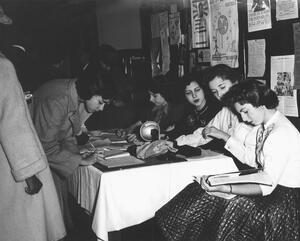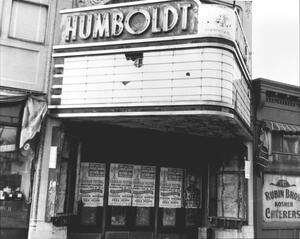Joan Krizack wins Champion of Freedom Award for the Documenting Diversity Project
Registration for the 1954 TABS Conference with B'nai B'rith girls (Brandeis chapter) as hostesses at Freedom House, Roxbury, MA.
Courtesy of Northeastern University Libraries, Archives and Special Collections Department.
A group of Jewish youth (most likely in the B'nei Akiva Zionist youth organization) with the American and Israeli flags on the steps of Freedom House in 1953.
Courtesy of Northeastern University Libraries, Archives and Special Collections Department.
Humboldt Theatre marquee next to Rubin Bros. Kosher Caterers advertising with posters for Chanukah Festival held at Boston Garden on Sunday December 18, 1949, on front windows in Roxbury, MA.
Courtesy of Northeastern University Libraries, Archives and Special Collections Department.
In 1998, Northeastern University announced that it had received a two-year federal grant to “identify, locate, secure, and make accessible the most important and at-risk historical records of Boston’s African American, Chinese, gay and lesbian, and Latino communities.” Later that year, I met Joan Krizack, Northeastern’s University Archivist and Head of Special Collections, who had conceived the “Documenting Diversity Project.” I could see immediately that this diminutive woman (who has been a member of the Jewish Women’s Archive Technical Advisory Committee since 2006) had a “tiger by the tail” and was not about to let it go.
Sure enough, even when the outside funding ended, Joan and her team continued their work. They established documentation priorities, developed a database, and produced a brochure for each of the four communities—all designed to raise awareness of the importance of preserving historical records.
One of the most important and most comprehensive collections belonged to Freedom House. Last month, more than a dozen years after “Documenting Diversity” began, Joan received a Freedom House Champions of Freedom Award in recognition of her work preserving the organization’s historical records.
African American social workers Muriel and Otto Snowden founded Freedom House in 1949 as a center and catalyst for community activism in Roxbury. For the next 37 years, the Snowdens served as co-directors of Freedom House. Committed residents of Roxbury, they were committed to preserving it as a stable, middle-class, racially mixed neighborhood.
They were keenly aware of the historical significance of their work and of the records that documented it. As a result, the Freedom House records that Northeastern acquired and processed as part of the “Documenting Diversity Project” now occupy 62 cubic feet in the NEU library. The collection includes over 4,400 photographs, negatives, and slides. So far, there has been funding to digitize those from the period 1950-1975.
People who know Roxbury now as a neighborhood with few white residents may be surprised to learn that in the first decades of the 20th century, it had a large population of middle-class Jews. Even if they had moved to other parts of Boston or to the suburbs, many Jewish families had deep ties to the neighborhood and supported the Snowdens’ desire to maintain an integrated Roxbury. The first building Freedom House purchased was the Hebrew Teachers’ College on Crawford Street. In the early years of Freedom House, there were Jews on the Board of Directors, Jewish organizations held meetings and events there, and Jewish youth were involved in Freedom House programs.
Sadly, in spite of the Snowdens’ efforts, Roxbury did not remain an integrated neighborhood. But thanks to the care with which they documented their work at Freedom House and to the commitment of Joan Krizack and the Northeastern University Libraries to preserving that record, the Freedom House story has not been lost. Although it requires a trip to the NEU Archives to examine the documents, 2,300 images have been digitized and can be viewed on the NEU website.
Joan Krizack will soon become a consultant to Northeastern, on her way to retirement. I can only hope that her successor will be as dedicated as she has been to “documenting diversity.”









Thank you for recognizing Joan Krizack's dedication and effectiveness. Congratulations to an outstanding professional and wonderful person; and bravo, Northeastern University Libraries for appreciating the value of this work.